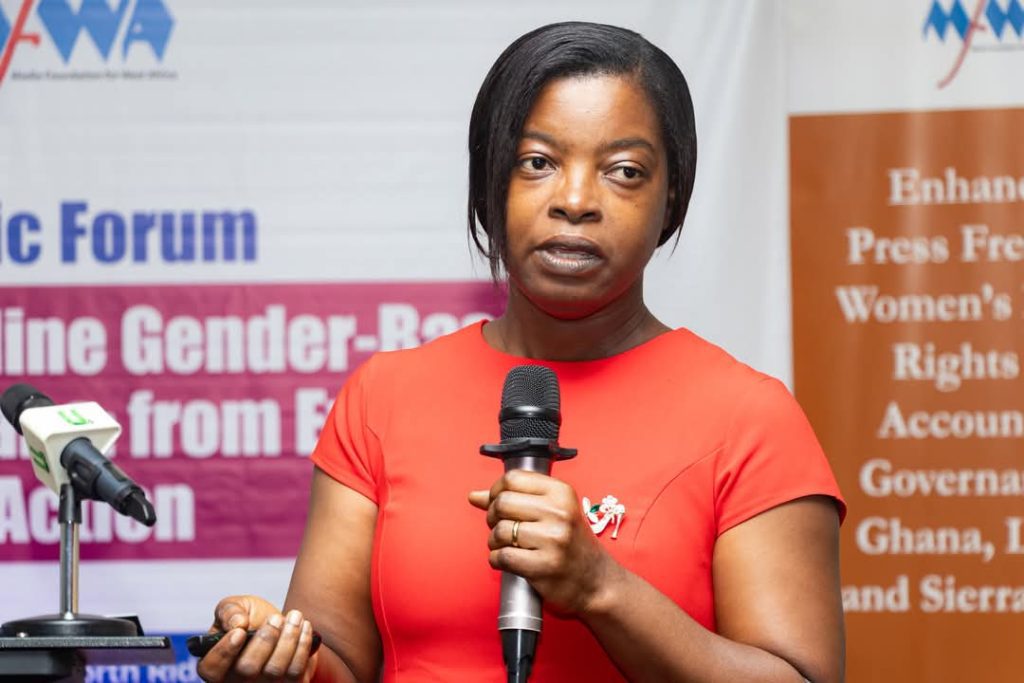|
Getting your Trinity Audio player ready...
|
The Media Foundation for West Africa (MFWA) has urged the government to implement strict policies to address online gender-based violence (OGBV) and protect victims.
Ms. Dora Boamah Mawutor, Programme Director for Freedom of Expression and Digital Rights at MFWA, made the call after presenting a report on the alarming prevalence of OGBV at a public forum in Accra. The report, based on monitoring five social media platforms between August 2024 and March 2025, recorded 583 incidents, with X (formerly Twitter) leading with 237 cases, followed by Facebook, TikTok, and Instagram.
The report revealed that many attacks targeted female presidential candidates, vice-presidential candidates, MPs, spokespersons, and other influential women. Most OGBV posts originated from individual accounts owned by men using pseudonyms, often unrelated to political discourse but aimed at insulting and discrediting female public figures. Ms. Mawutor noted that during the first three months of monitoring, women facing online abuse were often insulted with references to their ‘mothers’ genitalia’ or labelled as ‘prostitutes’ and accused of sleeping with top party officials.
The five most targeted women were Madam Ellen Ama Daaku, an advocate for women and children’s rights, with 83 posts; Mrs. Jean Mensa, Chairperson of the Electoral Commission, with 57 posts; Mrs. Samira Bawumia, wife of the former Vice President, with 47 posts; Vice President Professor Jane Naana Opoku-Agyemang, with 19 posts; and Nana Aba Anamoah, a media personality, with 11 posts. The study confirmed that online abuse is used as a deliberate tool to silence female politicians and discourage their participation in public discourse.
To combat this, MFWA, with support from the Dutch Foreign Ministry, launched training programmes to empower women in politics and advocacy. Ahead of the 2024 elections, 200 female politicians and 30 influencers received training on online safety and countering gender-based violence. Ms. Kathleen Addy, Chairperson of the National Commission for Civic Education, said that false information, hate speech, and threats against women online stemmed from deep-rooted gender inequalities and sociocultural biases.
“The online space, though filled with challenges, also has the power to be a force for good in preventing and responding to online-based violence,” she noted. Ms. Addy affirmed NCCE’s commitment to working with MFWA and other stakeholders to safeguard women in politics from digital harassment and to confront gender norms that hinder their political advancement. Madam Awo Aidan Amenya, Executive Director of Child Online Africa, emphasized the growing prevalence of narcissistic online behaviour and condemned the practice of women being paid to damage others’ reputations, calling it unacceptable.
She underscored the need for digital literacy, effective communication, and emotional intelligence to curb such misconduct. Corporal Gwendoline Abbey, Digital Forensic Analyst at the Cyber Crime Unit, Ghana Police Service, said the findings were consistent with cases her unit had handled. She urged families of victims to support investigations, saying, “How much money will they pay you to talk ill of another person or wish another person ill? It’s unfortunate how such people have followers too.” She advised families to prioritize justice for victims over concerns about family image.
Source: GNA


